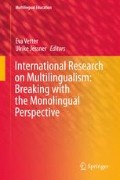Abstract
Research on third language acquisition (TLA) has come a long way since the first International Conference on Third Language Acquisition and Multilingualism was held in 1999 at the University of Innsbruck (Austria). Not only has it contributed significantly to the field of second language acquisition, but it has established itself as a field on its own. This volume furthers research on TLA by offering insights into international research on multilingual learning and use. Particular attention is put on new research concepts and the exploration of contact phenomena such as transfer and language learning strategies in diverse language contact scenarios. The concepts introduced in Part I (concepts of multilingualism research) build upon existing paradigms but at the same time move further in their conceptualisations and categorisations concerning multilingual learning and use (e.g. dominant language constellation and communicative competence). Different approaches are offered in Part II (transfer phenomena in multilingual learning and use) to investigate contact phenomena such as transfer in a range of third language learning contexts. Part III (language learning strategies) explores different perspectives of research on language learning strategies in multilingual learning ranging from individual cases to strategy modelling.
Access this chapter
Tax calculation will be finalised at checkout
Purchases are for personal use only
References
Allgaeuer, E., Hofer, B., & Jessner, U. (2016). Emerging multi-/plurilingual awareness in educational contexts: From theory to practice. Canadian Modern Language Review, 72(2), 157–182.
Aronin, L. (2006). Dominant language constellations: An approach to multilingualism studies. In M. Ó. Laoire (Ed.), Multilingualism in educational settings (pp. 140–159). Hohengehren: Schneider Publications.
Aronin, L. (2016). Multicompetence and dominant language constellation. In V. Cook & W. Li (Eds.), The Cambridge handbook of linguistic multicompetence (pp. 142–163). Cambridge: Cambridge University Press.
Blackledge, A., & Creese, A. (Eds.). (2014). Heteroglossia as practice and pedagogy. Berlin: Springer.
Blommaert, J. (2010). The sociolinguistics of globalization. Cambridge: Cambridge University Press.
Canagarajah, A. S. (2013). Translingual practice: Global Englishes and cosmopolitan relations. New York: Routledge.
Cook, V. (2003). Introduction. The changing L1 in the L2 user’s mind. In V. Cook (Ed.), Effects of the second language on the first (pp. 1–18). Clevedon: Multilingual Matters.
Council of Europe. (2001). Common European framework of reference for languages. Strasbourg: Council of Europe.
Council of Europe. (2008). White paper on intercultural dialogue ‘living together as equals in dignity’. Strasbourg: Council of Europe. http://www.coe.int/t/dg4/intercultural/Source/White%20Paper_final_revised_EN.pdf. Accessed 28 Nov 2018.
De Angelis, G., & Otwinowska, A. (Eds.). (2014). Teaching and learning in multilingual contexts: Sociolinguistic and educational perspectives. Clevedon: Multilingual Matters.
De Angelis, G., Kresic, M., & Jessner, U. (Eds.). (2015). Crosslinguistic influence and crosslinguistic interaction in multilingual language learning. London: Bloomsbury.
De Bot, K. (2008). Introduction: Second language development as a dynamic process. The Modern Language Journal, 92, 166–178. https://doi.org/10.1111/j.1540-4781.2008.00712.x.
Gregersen, T., & MacIntyre, P. D. (2014). Capitalizing on language learners’ individuality. From premise to practice. Clevedon: Multilingual Matters.
Grosjean, F. (1985). The bilingual as a special but competent speaker-hearer. Journal of Multilingual and Multicultural Development, 6(6), 467–477.
Grosjean, F. (2001). The bilingual’s language modes. In J. Nicole (Ed.), One mind, two languages: Bilingual language processing (pp. 1–25). Oxford: Blackwell.
Grosjean, F. (2010). Bilingual. Cambridge, MA: Harvard University Press.
Grosjean, F. (2013). Bilingualism: A short introduction. In F. Grosjean & P. Li (Eds.), The psycholinguistics of bilingualism (pp. 5–25). London: Wiley-Blackwell.
Herdina, P., & Jessner, U. (2002). A dynamic model of multilingualism. Perspectives of change in psycholinguistics. Clevedon: Multilingual Matters.
Jessner, U. (2006). Linguistic awareness in multilinguals. English as a third language. Edinburgh: Edinburgh University Press.
Jessner, U. (2008). Teaching third languages: Findings, trends, and challenges. Language Teaching, 41(1), 15–56.
Jessner, U., & Török, V. (2017). Strategies in multilingual learning: Opening new research avenues. In S. Pfenninger & J. Navracsics (Eds.), Implications for the future: Applied linguistics perspectives (pp. 192–211). Bristol: Multilingual Matters.
Jørgensen, J. N., Karrebæk, M. S., Madsen, L. M., & Møller, L. S. (2011). Polylanguaging in superdiversity. Diversities, 13(2). www.unesco.org/shs/diversities/vol13/issue2/art2. Accessed 22 Feb 2019.
Kemp, C. (2009). Defining multilingualism. In L. Aronin & B. Hufeisen (Eds.), The exploration of multilingualism (pp. 11–26). Amsterdam: John Benjamins.
Kramsch, C. (2014). Introduction. Teaching foreign languages in an era of globalization. Modern Language Journal, 98(1), 296–311.
Larsen-Freeman, D., & Cameron, L. (2008). Complex systems and applied linguistics. Oxford: Oxford University Press.
May, S. (2014). The multilingual turn: Implications for SLA, TESOL, and bilingual education. Oxford: Routledge.
Moore, D. (2006). Plurilinguisme et école. Paris: Didier.
Odlin, T. (2016). Was there really ever a contrastive analysis hypothesis? In R. Alonso (Ed.), Crosslinguistic influence in second language acquisition (pp. 1–23). Bristol: Multilingual Matters.
Ortega, L. (2009). Understanding second language acquisition. London: Routledge.
Ortega, L. (2014). Experience and success in late bilingualism. Plenary address at the AILA congress in Brisbane, Australia, 11 August 2014.
Otsuji, E., & Pennycook, A. (2010). Metrolingualism: Fixity, fluidity and language in flux. International Journal of Multilingualism, 7(3), 240–254.
Oxford, R. (1990). Language learning strategies: What every teacher should know. Boston: Heinle and Heinle publishers.
Author information
Authors and Affiliations
Corresponding authors
Editor information
Editors and Affiliations
Rights and permissions
Copyright information
© 2019 Springer Nature Switzerland AG
About this chapter
Cite this chapter
Vetter, E., Jessner, U. (2019). Introduction: Advances in the Study of Third Language Acquisition and Multilingualism. In: Vetter, E., Jessner, U. (eds) International Research on Multilingualism: Breaking with the Monolingual Perspective. Multilingual Education, vol 35. Springer, Cham. https://doi.org/10.1007/978-3-030-21380-0_1
Download citation
DOI: https://doi.org/10.1007/978-3-030-21380-0_1
Published:
Publisher Name: Springer, Cham
Print ISBN: 978-3-030-21379-4
Online ISBN: 978-3-030-21380-0
eBook Packages: EducationEducation (R0)

